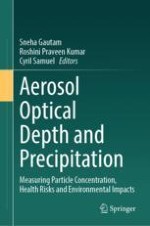2024 | OriginalPaper | Chapter
Impact Assessments of Aerosol Optical Depth and Lightning on Thunderstorm Over the Region of Uttarakhand, India
Authors : Alok Sagar Gautam, Sanjeev Kumar, Karan Singh, Shyam Narayan Nautiyal, Sneha Gautam
Published in: Aerosol Optical Depth and Precipitation
Publisher: Springer Nature Switzerland
Activate our intelligent search to find suitable subject content or patents.
Select sections of text to find matching patents with Artificial Intelligence. powered by
Select sections of text to find additional relevant content using AI-assisted search. powered by
